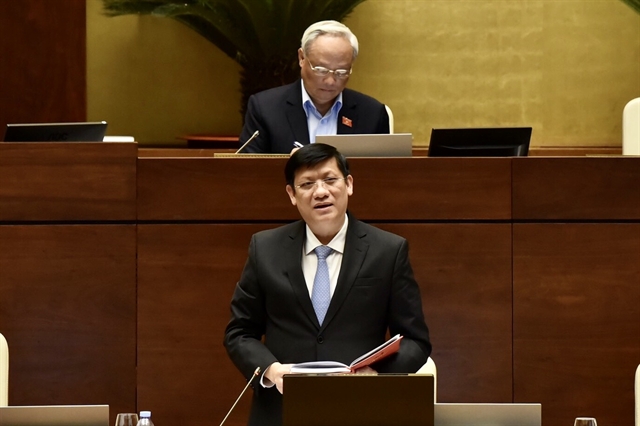 Politics & Law
Politics & Law


|
| Acting Minister of Health Nguyễn Thanh Long presents a report on the draft amended Law on HIV/AIDS Prevention and Control at the National Assembly discussion on Friday. Photo chinhphu.vn |
HÀ NỘI — The majority of lawmakers agreed that the amended Law on HIV/AIDS Prevention and Control should increase the number of people who can access information on HIV-infected people at a National Assembly discussion on Friday.
Deputies said doing so would ensure proper treatment, payment of medical examination and treatment costs and prevent infection of those who take care of and treat the patients.
According to Phạm Văn Hòa, a deputy from Đồng Tháp Province, greater information access was essential to prevent infection among parents, wives or caregivers.
However, he underlined the necessity to ensure the confidentiality of information on HIV-infected people so they would not face stigma.
Deputy Triệu Thanh Dung from Cao Bằng Province said adding more people who can access information might negatively impact HIV-infected people.
She cited the results of a survey conducted by the Ministry of Health on 1,800 HIV-infected people which showed 27.8 per cent of them disagreed with this provision due to their fear of information disclosure.
“The wishes and aspiration of people living with HIV/AIDS should be given priority to create the best conditions for treating and caring for them," Dung said.
Regarding the fund for the treatment and care of HIV/AIDS-infected people, she said it was not necessary to maintain the fund due to a number of limitations relating to its performance.
The fund has mobilised just more than VNĐ5.7 billion (US$ 245,000) over the past 12 years, Dung said.
The main purpose of the fund is to help infected people access HIV/AIDS treatment or care for those in the latter stages of the disease. However, in recent years, its activities have mainly been giving gifts, milk and buying health insurance cards for children with HIV/AIDS aged from six to 15, she said.
Most deputies agreed with amending and supplementing the law.
They said the law should be amended to strengthen the protection and care for people’s health, overcoming the shortcomings of the current law and meeting the requirement of HIV/AIDS prevention and control work.
Many deputies said some provisions of the law were no longer consistent with current practices. There were also conflicts between some related laws on the treatment and care of infected people.
Those shortcomings should be revised soon to ensure consistency and improve the effectiveness of law enforcement, they said.
Presenting a report on the draft law, Acting Minister of Health Nguyễn Thanh Long said Việt Nam has recorded remarkable results in HIV/AIDS prevention and control.
Việt Nam is one of four countries with the best HIV/AIDS treatment in the world along with Germany, the UK and Switzerland, he said.
The country has kept the community HIV infection rate below 0.3 per cent.
According to the United States Agency for International Development (USAID), since 2000 the country has deployed preventive measures to stop 400,000 people from being infected with HIV and 150,000 received treatment that stopped them dying from AIDS.
Viet Nam has a rate of HIV-infected people receiving antiretroviral (ARV) treatment with a viral load below the inhibitory threshold reaching 96 per cent, contributing to reducing community HIV infection.
Long said despite positive results in HIV/AIDS prevention and control, some shortcomings remain.
The current law still has many limitations, with no specific regulation on who is entitled to access information about HIV-infected people. It failed to create an adequate legal corridor for HIV/AIDS epidemic surveillance and access with a view to providing timely support and treatment for infected people.
He said the revision of the law aimed at realising the target of basically putting an end to the disease by 2030. — VNS




